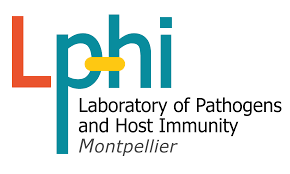Toxoplasma gondii mitochondrial transporter ABCB7L is essential for the biogenesis of cytosolic and nuclear iron-sulfur cluster proteins and cytosolic translation
Résumé
clusters are ubiquitous inorganic cofactors required for numerous essential cellular pathways. Since they cannot be scavenged from the environment, Fe-S clusters are synthesized de novo in cellular compartments such as the apicoplast, mitochondrion, and cytosol. The cytosolic Fe-S cluster biosynthesis pathway relies on the transport of an intermediate from the mitochondrial pathway. An ATP-bind ing cassette (ABC) transporter called ABCB7 is responsible for this role in numerous commonly studied organisms, but its role in the medically important apicomplexan parasites has not yet been studied. Here we identify and characterize a Toxoplasma gondii ABCB7 homolog, which we name ABCB7-like (ABCB7L). Genetic depletion shows that it is essential for parasite growth and that its disruption triggers partial stage conversion. Characterization of the knock-down line highlights a defect in the biogenesis of cytosolic and nuclear Fe-S proteins leading to defects in protein translation and other pathways including DNA and RNA replication and metabolism. Our work provides support for a broad conservation of the connection between mitochondrial and cytosolic pathways in Fe-S cluster biosynthesis and reveals its importance for parasite survival. IMPORTANCE Iron-sulfur (Fe-S) clusters are inorganic cofactors of proteins that play key roles in numerous essential biological processes, for example, respiration and DNA replication. Cells possess dedicated biosynthetic pathways to assemble Fe-S clusters, including a pathway in the mitochondrion and cytosol. A single transporter, called ABCB7, connects these two pathways, allowing an essential intermediate generated by the mitochondrial pathway to be used in the cytosolic pathway. Cytosolic and nuclear Fe-S proteins are dependent on the mitochondrial pathway, mediated by ABCB7, in numerous organisms studied to date. Here, we study the role of a homolog of ABCB7, which we name ABCB7-like (ABCB7L), in the ubiquitous unicellular apicom plexan parasite Toxoplasma gondii. We generated a depletion mutant of Toxoplasma ABCB7L and showed its importance for parasite fitness. Using comparative quantitative proteomic analysis and experimental validation of the mutants, we show that ABCB7L is required for cytosolic and nuclear, but not mitochondrial, Fe-S protein biogenesis. Our study supports the conservation of a protein homologous to ABCB7 and which has a similar function in apicomplexan parasites and provides insight into an understudied aspect of parasite metabolism.
| Origine | Fichiers éditeurs autorisés sur une archive ouverte |
|---|
